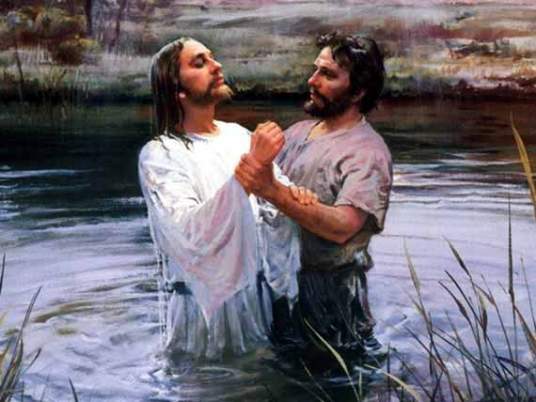Last night I went to a mans home with hope to teach him the gospel of Jesus Christ. As we spoke, he kept referencing the book of Romans, in the New Testament. His comment was, "If Paul taught the people in this epistle that faith was enough, then it is enough for me." No matter what was taught in the lesson, he kept referencing that statement.

So, in this post, I hope to cover some points that I was not prepared to cover last night. First, who was Paul addressing in the Epistle of Romans? He was living in Corinth at the time. He was hoping to make a trip to Jerusalem, and IF he survived the trip, he would then head over to Rome, to be with the saints there for a time. Reference The letter or epistle was an attempt to prepare them for his anticipated arrival. One of the main problems that he needed to address was the separation between Jews and Gentiles, because of rituals, namely circumcision. The Jews, according to previous tradition showed their faith in Judaism, by circumcision. The Gentiles had not been circumcised. Paul was trying to teach them that even though their traditions were different, their riotousness depended on their faith, not the outward signs of their religious practice. He taught that Abraham was good and faithful even before circumcision. Which is why he was chosen to be a father of nations. Even after his circumcision, it was his faith in Gods word which produced Isaac in his old age, not his circumcision. So, faith is heart based, not ritual based.

I am a member of the Church of Jesus Christ of Latter Day Saints. I am also known as a Mormon. As I have taught many people the gospel, one of the main hang ups I have found, is that we have a different way of saying things. We believe that throught he atonement of Christ, everyone can be saved, by obedience to the laws and ordinances of the gospel. I have told that to people, and they say, "Oh wait, you mean, you believe that Jesus Christs grace is not sufficient?" But, as we talk about it, and I ask them about faith, we come to the same conclusion. It is this, a literal definition of faith in your own life. What is Faith? I asked the man last night. He said, "faith is knowing that Jesus Christ is my savior, and wanting to follow his teaching even or especially when no one is watching." Why do we add that second part? Why do we add the action to the knowing?

In James chapter 2 we read that faith without works is dead. What does that mean? In the Book of Mormon there is a little analogy of a seed starting in vs. 28. The seed is the word of God. If you plant his word in your heart, and it is good, it will grow and swell, and help you to understand things of God better. But, even this is not a perfect knowledge, so how do you get that perfect knowledge? You nourish that seed. How do you nourish a seed? Again Christ teaches another analogy of the seed in Mark chapter 4 He starts to explain the parable in vs 14. So what can we do, to nourish and grow the gospel of Jesus Christ in our hearts? Lets go back to Romans and James. They both reference Abraham, because of his great faith. What did the Lord ask Abraham to do? He was asked to give his only son as a sacrifice. We see that this is an action. What about the Noah? He was commanded to build an ark. Moses? Hold up his staff to part the red sea. Adam? he was commanded to give burnt offerings. Jonah? Preach to the people of Nineveh. Peter? Fish for men. Paul? Leave his former life and preach the gospel of Jesus Christ. What about people who were not apostles or prophets? Nicodemus asked what he could do. Jesus told him to be baptized. The children of Israel are plagued with fiery serpents, what does the Lord command them to do? Look at the serpent on a pole, constructed by Moses and live. He also commands them to cross the sea. Rahab the harlot received messengers from the camp of Israel, and sent them out another way, believing and saving her family. James calls her justified by her works. So, what am I getting at, with these examples? Faith is dead with out our works. Our seeds of faith die, not because the seed is bad, but because we are not nourishing the seed with our works.

Christ says, "If ye love me, keep my commandments." By faith we nourish the word of God in our hearts. Through nourishment or action that faith grows. Now, for the next question, Why Baptism? Does God need us to prove our commitment to him? No. So, why does he ask us to? For our benefit. I was baptized at 8 years old. I made a covenant with Heavenly Father. I promised to take his name, or become a Christian. I promised to care for others. I promised to keep his commandments, and to testify of Him. In return, I believe he promised me that he would forgive my sins. I received the gift of having the Holy Ghost with me at all times as long as I was a worthy vessel. I was also given the promise that as I live the gospel, I will be able to live with him again. Through this covenant, I feel great strength, given to me from a loving Heavenly Father. I believe that he asked me to make this covenant, to give me the added strength and help. He loves me enough to ask me to make a commitment.

-With love.
No comments:
Post a Comment